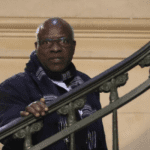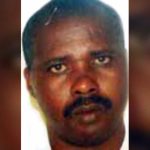The prosecution of a person suspected of funding the 1994 genocide in Rwanda has been put on hold by the International Criminal Court (ICC).
After 26 years of escaping capture, 90-year-old Félicien Kabuga was about to go on trial, but his attorneys claim he is not competent to stand trial due to dementia.
Mr Kabuga’s health was examined, and the International Residual Mechanism for Criminal Tribunals approved of a break.
According to allegations, he provided funding for ethnic Hutu militias that killed roughly 800,000 Tutsis and moderate Hutus.
Report says the killings took place over just 100 days.
It is alleged that he used his large fortune made in the 1970s tea trade to buy machetes used to arm the Hutu death squads.
The wealthy businessman is also accused of using his radio station to urge Hutus to kill rival Tutsis, fuelling the genocide by broadcasting inflammatory hate speech.
He has denied all the charges.
Mr. Kabuga was arrested in 2020 after managing to avoid capture for decades. French investigators tracked him down to an apartment in Paris where he had been living under a false identity.
Survivors of the genocide have previously expressed concerns that justice might not be served if Mr. Kabuga dies without facing trial at the ICC, which was already expected to take years.
Tunisian President dissolves municipal councils
Tunisian President Kais Saied has dissolved municipal councils months before they were scheduled to be elected, further undermining the democratic systems established following the 2011 revolution.
The municipal councils will be replaced by “special delegations”, made up of civil servants and placed under the supervision of the governor of each region.
According a statement by Kais Saied, the new councils will be under new rules that he will write.
The mandates of the 350 mayors and municipal councilors currently in place are due to expire at the end of April, and elections were theoretically scheduled to follow.
Ennahda, the party that has been the most vocal critic of Saied, won control of one-third of municipal councils in the 2018 local elections.
Elected municipal councils were established after the 2014 constitution called for decentralisation, a constitution that Saied has since replaced with one he wrote himself and passed in a referendum with a low turnout last year.
The prosecution of a person suspected of funding the 1994 genocide in Rwanda has been put on hold by the International Criminal Court (ICC).
After 26 years of escaping capture, 90-year-old Félicien Kabuga was about to go on trial, but his attorneys claim he is not competent to stand trial due to dementia.
Mr Kabuga’s health was examined, and the International Residual Mechanism for Criminal Tribunals approved of a break.
According to allegations, he provided funding for ethnic Hutu militias that killed roughly 800,000 Tutsis and moderate Hutus.
Report says the killings took place over just 100 days.
It is alleged that he used his large fortune made in the 1970s tea trade to buy machetes used to arm the Hutu death squads.
The wealthy businessman is also accused of using his radio station to urge Hutus to kill rival Tutsis, fuelling the genocide by broadcasting inflammatory hate speech.
He has denied all the charges.
Mr. Kabuga was arrested in 2020 after managing to avoid capture for decades. French investigators tracked him down to an apartment in Paris where he had been living under a false identity.
Survivors of the genocide have previously expressed concerns that justice might not be served if Mr. Kabuga dies without facing trial at the ICC, which was already expected to take years.
Tunisian President dissolves municipal councils
Tunisian President Kais Saied has dissolved municipal councils months before they were scheduled to be elected, further undermining the democratic systems established following the 2011 revolution.
The municipal councils will be replaced by “special delegations”, made up of civil servants and placed under the supervision of the governor of each region.
According a statement by Kais Saied, the new councils will be under new rules that he will write.
The mandates of the 350 mayors and municipal councilors currently in place are due to expire at the end of April, and elections were theoretically scheduled to follow.
Ennahda, the party that has been the most vocal critic of Saied, won control of one-third of municipal councils in the 2018 local elections.
Elected municipal councils were established after the 2014 constitution called for decentralisation, a constitution that Saied has since replaced with one he wrote himself and passed in a referendum with a low turnout last year.
The prosecution of a person suspected of funding the 1994 genocide in Rwanda has been put on hold by the International Criminal Court (ICC).
After 26 years of escaping capture, 90-year-old Félicien Kabuga was about to go on trial, but his attorneys claim he is not competent to stand trial due to dementia.
Mr Kabuga’s health was examined, and the International Residual Mechanism for Criminal Tribunals approved of a break.
According to allegations, he provided funding for ethnic Hutu militias that killed roughly 800,000 Tutsis and moderate Hutus.
Report says the killings took place over just 100 days.
It is alleged that he used his large fortune made in the 1970s tea trade to buy machetes used to arm the Hutu death squads.
The wealthy businessman is also accused of using his radio station to urge Hutus to kill rival Tutsis, fuelling the genocide by broadcasting inflammatory hate speech.
He has denied all the charges.
Mr. Kabuga was arrested in 2020 after managing to avoid capture for decades. French investigators tracked him down to an apartment in Paris where he had been living under a false identity.
Survivors of the genocide have previously expressed concerns that justice might not be served if Mr. Kabuga dies without facing trial at the ICC, which was already expected to take years.
Tunisian President dissolves municipal councils
Tunisian President Kais Saied has dissolved municipal councils months before they were scheduled to be elected, further undermining the democratic systems established following the 2011 revolution.
The municipal councils will be replaced by “special delegations”, made up of civil servants and placed under the supervision of the governor of each region.
According a statement by Kais Saied, the new councils will be under new rules that he will write.
The mandates of the 350 mayors and municipal councilors currently in place are due to expire at the end of April, and elections were theoretically scheduled to follow.
Ennahda, the party that has been the most vocal critic of Saied, won control of one-third of municipal councils in the 2018 local elections.
Elected municipal councils were established after the 2014 constitution called for decentralisation, a constitution that Saied has since replaced with one he wrote himself and passed in a referendum with a low turnout last year.
The prosecution of a person suspected of funding the 1994 genocide in Rwanda has been put on hold by the International Criminal Court (ICC).
After 26 years of escaping capture, 90-year-old Félicien Kabuga was about to go on trial, but his attorneys claim he is not competent to stand trial due to dementia.
Mr Kabuga’s health was examined, and the International Residual Mechanism for Criminal Tribunals approved of a break.
According to allegations, he provided funding for ethnic Hutu militias that killed roughly 800,000 Tutsis and moderate Hutus.
Report says the killings took place over just 100 days.
It is alleged that he used his large fortune made in the 1970s tea trade to buy machetes used to arm the Hutu death squads.
The wealthy businessman is also accused of using his radio station to urge Hutus to kill rival Tutsis, fuelling the genocide by broadcasting inflammatory hate speech.
He has denied all the charges.
Mr. Kabuga was arrested in 2020 after managing to avoid capture for decades. French investigators tracked him down to an apartment in Paris where he had been living under a false identity.
Survivors of the genocide have previously expressed concerns that justice might not be served if Mr. Kabuga dies without facing trial at the ICC, which was already expected to take years.
Tunisian President dissolves municipal councils
Tunisian President Kais Saied has dissolved municipal councils months before they were scheduled to be elected, further undermining the democratic systems established following the 2011 revolution.
The municipal councils will be replaced by “special delegations”, made up of civil servants and placed under the supervision of the governor of each region.
According a statement by Kais Saied, the new councils will be under new rules that he will write.
The mandates of the 350 mayors and municipal councilors currently in place are due to expire at the end of April, and elections were theoretically scheduled to follow.
Ennahda, the party that has been the most vocal critic of Saied, won control of one-third of municipal councils in the 2018 local elections.
Elected municipal councils were established after the 2014 constitution called for decentralisation, a constitution that Saied has since replaced with one he wrote himself and passed in a referendum with a low turnout last year.
The prosecution of a person suspected of funding the 1994 genocide in Rwanda has been put on hold by the International Criminal Court (ICC).
After 26 years of escaping capture, 90-year-old Félicien Kabuga was about to go on trial, but his attorneys claim he is not competent to stand trial due to dementia.
Mr Kabuga’s health was examined, and the International Residual Mechanism for Criminal Tribunals approved of a break.
According to allegations, he provided funding for ethnic Hutu militias that killed roughly 800,000 Tutsis and moderate Hutus.
Report says the killings took place over just 100 days.
It is alleged that he used his large fortune made in the 1970s tea trade to buy machetes used to arm the Hutu death squads.
The wealthy businessman is also accused of using his radio station to urge Hutus to kill rival Tutsis, fuelling the genocide by broadcasting inflammatory hate speech.
He has denied all the charges.
Mr. Kabuga was arrested in 2020 after managing to avoid capture for decades. French investigators tracked him down to an apartment in Paris where he had been living under a false identity.
Survivors of the genocide have previously expressed concerns that justice might not be served if Mr. Kabuga dies without facing trial at the ICC, which was already expected to take years.
Tunisian President dissolves municipal councils
Tunisian President Kais Saied has dissolved municipal councils months before they were scheduled to be elected, further undermining the democratic systems established following the 2011 revolution.
The municipal councils will be replaced by “special delegations”, made up of civil servants and placed under the supervision of the governor of each region.
According a statement by Kais Saied, the new councils will be under new rules that he will write.
The mandates of the 350 mayors and municipal councilors currently in place are due to expire at the end of April, and elections were theoretically scheduled to follow.
Ennahda, the party that has been the most vocal critic of Saied, won control of one-third of municipal councils in the 2018 local elections.
Elected municipal councils were established after the 2014 constitution called for decentralisation, a constitution that Saied has since replaced with one he wrote himself and passed in a referendum with a low turnout last year.
The prosecution of a person suspected of funding the 1994 genocide in Rwanda has been put on hold by the International Criminal Court (ICC).
After 26 years of escaping capture, 90-year-old Félicien Kabuga was about to go on trial, but his attorneys claim he is not competent to stand trial due to dementia.
Mr Kabuga’s health was examined, and the International Residual Mechanism for Criminal Tribunals approved of a break.
According to allegations, he provided funding for ethnic Hutu militias that killed roughly 800,000 Tutsis and moderate Hutus.
Report says the killings took place over just 100 days.
It is alleged that he used his large fortune made in the 1970s tea trade to buy machetes used to arm the Hutu death squads.
The wealthy businessman is also accused of using his radio station to urge Hutus to kill rival Tutsis, fuelling the genocide by broadcasting inflammatory hate speech.
He has denied all the charges.
Mr. Kabuga was arrested in 2020 after managing to avoid capture for decades. French investigators tracked him down to an apartment in Paris where he had been living under a false identity.
Survivors of the genocide have previously expressed concerns that justice might not be served if Mr. Kabuga dies without facing trial at the ICC, which was already expected to take years.
Tunisian President dissolves municipal councils
Tunisian President Kais Saied has dissolved municipal councils months before they were scheduled to be elected, further undermining the democratic systems established following the 2011 revolution.
The municipal councils will be replaced by “special delegations”, made up of civil servants and placed under the supervision of the governor of each region.
According a statement by Kais Saied, the new councils will be under new rules that he will write.
The mandates of the 350 mayors and municipal councilors currently in place are due to expire at the end of April, and elections were theoretically scheduled to follow.
Ennahda, the party that has been the most vocal critic of Saied, won control of one-third of municipal councils in the 2018 local elections.
Elected municipal councils were established after the 2014 constitution called for decentralisation, a constitution that Saied has since replaced with one he wrote himself and passed in a referendum with a low turnout last year.
The prosecution of a person suspected of funding the 1994 genocide in Rwanda has been put on hold by the International Criminal Court (ICC).
After 26 years of escaping capture, 90-year-old Félicien Kabuga was about to go on trial, but his attorneys claim he is not competent to stand trial due to dementia.
Mr Kabuga’s health was examined, and the International Residual Mechanism for Criminal Tribunals approved of a break.
According to allegations, he provided funding for ethnic Hutu militias that killed roughly 800,000 Tutsis and moderate Hutus.
Report says the killings took place over just 100 days.
It is alleged that he used his large fortune made in the 1970s tea trade to buy machetes used to arm the Hutu death squads.
The wealthy businessman is also accused of using his radio station to urge Hutus to kill rival Tutsis, fuelling the genocide by broadcasting inflammatory hate speech.
He has denied all the charges.
Mr. Kabuga was arrested in 2020 after managing to avoid capture for decades. French investigators tracked him down to an apartment in Paris where he had been living under a false identity.
Survivors of the genocide have previously expressed concerns that justice might not be served if Mr. Kabuga dies without facing trial at the ICC, which was already expected to take years.
Tunisian President dissolves municipal councils
Tunisian President Kais Saied has dissolved municipal councils months before they were scheduled to be elected, further undermining the democratic systems established following the 2011 revolution.
The municipal councils will be replaced by “special delegations”, made up of civil servants and placed under the supervision of the governor of each region.
According a statement by Kais Saied, the new councils will be under new rules that he will write.
The mandates of the 350 mayors and municipal councilors currently in place are due to expire at the end of April, and elections were theoretically scheduled to follow.
Ennahda, the party that has been the most vocal critic of Saied, won control of one-third of municipal councils in the 2018 local elections.
Elected municipal councils were established after the 2014 constitution called for decentralisation, a constitution that Saied has since replaced with one he wrote himself and passed in a referendum with a low turnout last year.
The prosecution of a person suspected of funding the 1994 genocide in Rwanda has been put on hold by the International Criminal Court (ICC).
After 26 years of escaping capture, 90-year-old Félicien Kabuga was about to go on trial, but his attorneys claim he is not competent to stand trial due to dementia.
Mr Kabuga’s health was examined, and the International Residual Mechanism for Criminal Tribunals approved of a break.
According to allegations, he provided funding for ethnic Hutu militias that killed roughly 800,000 Tutsis and moderate Hutus.
Report says the killings took place over just 100 days.
It is alleged that he used his large fortune made in the 1970s tea trade to buy machetes used to arm the Hutu death squads.
The wealthy businessman is also accused of using his radio station to urge Hutus to kill rival Tutsis, fuelling the genocide by broadcasting inflammatory hate speech.
He has denied all the charges.
Mr. Kabuga was arrested in 2020 after managing to avoid capture for decades. French investigators tracked him down to an apartment in Paris where he had been living under a false identity.
Survivors of the genocide have previously expressed concerns that justice might not be served if Mr. Kabuga dies without facing trial at the ICC, which was already expected to take years.
Tunisian President dissolves municipal councils
Tunisian President Kais Saied has dissolved municipal councils months before they were scheduled to be elected, further undermining the democratic systems established following the 2011 revolution.
The municipal councils will be replaced by “special delegations”, made up of civil servants and placed under the supervision of the governor of each region.
According a statement by Kais Saied, the new councils will be under new rules that he will write.
The mandates of the 350 mayors and municipal councilors currently in place are due to expire at the end of April, and elections were theoretically scheduled to follow.
Ennahda, the party that has been the most vocal critic of Saied, won control of one-third of municipal councils in the 2018 local elections.
Elected municipal councils were established after the 2014 constitution called for decentralisation, a constitution that Saied has since replaced with one he wrote himself and passed in a referendum with a low turnout last year.














